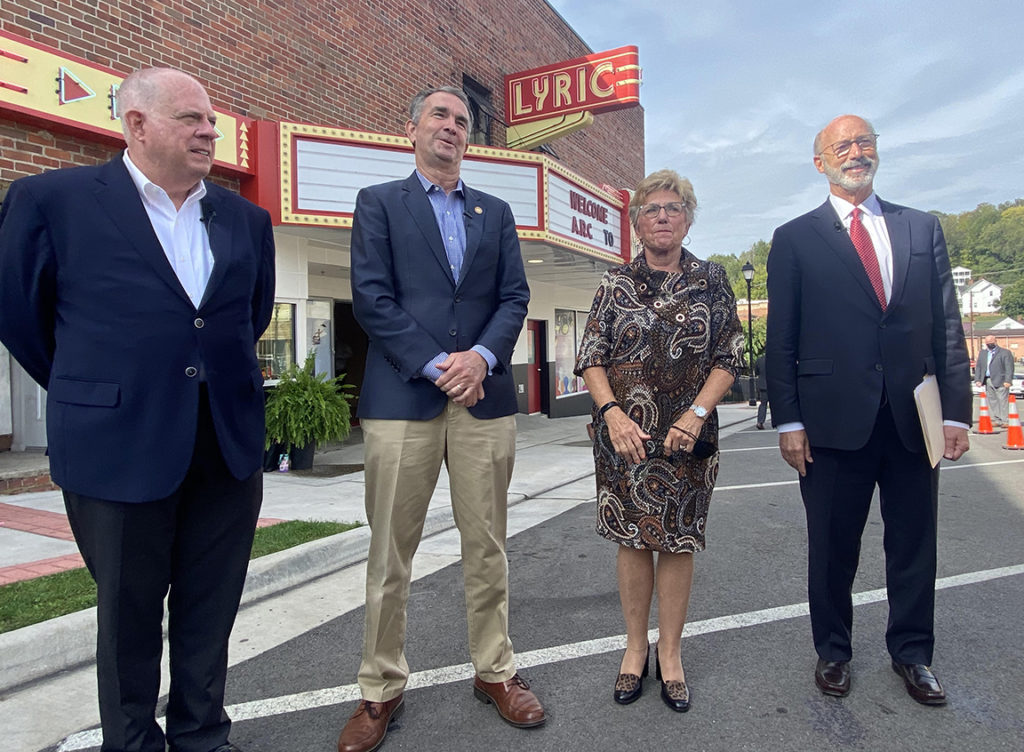
By Dave Ongie
Gayle Manchin, federal co-chair of the Appalachian Regional Commission, gave a short history lesson of the founding of the ARC on Tuesday morning outside the Lyric Theater in St. Paul, Virginia. As you’d expect from a former school teacher, Manchin’s lesson had a very practical application.
President Lyndon Johnson founded the commission in 1965, bringing to fruition an idea formulated by President John F. Kennedy prior to his assassination. It was Kennedy who said a state cannot grow unless it had a highway system, so the ARC was proposed in large part to build a network of highways through the Appalachian region.
“The irony today is we face a whole new highway system that has to be created because a state cannot grow without the broadband highway system that we talk about today,” Manchin said.
Indeed, bringing the high-speed “information superhighway” known as the Internet to the homes and businesses of every person in Appalachia was a main topic of conversation at the ARC meeting, which was held in St. Paul on Tuesday morning. Providing Internet access to folks in rural areas has been a topic of conversation for some time, but a sea change caused by the COVID-19 pandemic has provided more urgency to those discussions.
“We’ve all talked about broadband,” said Pennsylvania Governor Tom Wolf. “Broadband is something that is absolutely essential, and that was only reinforced by the pandemic.”
The ability to work remotely has led to people moving from cities to more rural locales where the cost of living is much lower and the quality of life is much higher. The catch is that high-speed Internet is required, which has so far prevented many parts of Appalachia from being able to attract young professionals.
In addition to a pressing need to expand Internet access, the COVID-19 pandemic has also presented a golden opportunity in the form of federal dollars. As Maryland Governor Larry Hogan pointed out, hundreds of millions of dollars have been spent in his state and in Virginia in an effort to equip more communities to equip current and future residents with the Internet connection they need to work remotely.
“I think we’re actually in better position than before because of the increased pandemic funding,” Hogan said. “It’s going to enable us to make more progress in Appalachia. Some of the federal funds have enabled us to do a lot of things we weren’t able to pay for before.”
Another hot topic at Tuesday’s meeting was the economic opportunity offered by outdoor recreation and tourism. The pandemic produced a surge of participation in every sector of the outdoor recreation business, and towns in Appalachia looking to diversify their economies following the rapid decline of the coal industry are all exploring ways that tourism can play a role in bolstering revenue.
“We’ve broken records this year of people wanting to get out and about,” Northam said. “Our funding is good. We’ve had some (American Rescue Plan) funding come through, and we’re taking every bit of advantage of that we can. This is a great opportunity to provide further investment in Appalachia.”
Manchin said additional ARC funding, which has helped transform towns like St. Paul in recent years, could become a reality if a current infrastructure bill meandering through Congress is passed and signed by President Joe Biden. The bill would up ARC’s annual budget by $30 million with an additional billion dollars over a five-year period earmarked for broadband and infrastructure projects in the Appalachian region.
“The infrastructure bill would give $210 million to ARC, which is a striking advancement over our current and past fiscal budget,” Manchin said. “We’re looking forward to having opportunities this year that we haven’t had before and we may never have again. So we want to take advantage of making sure we’re very strategic and that we’re collaborative.”
Another byproduct of the pandemic seems to be opening the door to more opportunity in the Appalachian region beyond ubiquitous broadband Internet access and plenty of federal funding to bolster tourism efforts. Supply chain issues are affecting nearly every sector of the economy, which may be a catalyst for the creation of more domestic manufacturing and production facilities.
On Monday, Northam announced a $714 million investment in a medical glove manufacturing facility in Wythe County that is projected to bring 2,500 jobs to that area. After competing against Pennsylvania, Maryland and other states for PPE at the beginning of the pandemic, Northam said the need to produce things in America hit home for a lot of people.
“It’s so important to be able to purchase and manufacture products right here in the United States,” Northam said. “We were getting supplies from China, Malaysia and Thailand. We weren’t sure when they were going to come and what was going to be in the boxes. To be able to have it made right here in the United States is a big, big deal.”



